Beijing, which will be hosting the Olympics in 2008, is in the middle of a construction boom. Cranes for constructing buildings are seen throughout the city, with new buildings sprouting everywhere. The roads are heavily congested due to the recent motorization development, and major traffic jams occur regularly on the main roads that criss-cross the city, even though these roads have multiple lanes for each direction resembling an American highway. During our visit, the skies of Beijing were gray as if the city was enshrouded in a fog.
The automobile market in China is expected to reach 7 million in 2006, surpassing Japan to become 2nd in the world. It is estimated that in 2010, the market will grow to 10 million, and by 2020, it will reach 25 million, surpassing the United States to become the largest automobile market in the world.
We visited the 9th Beijing International Automotive Exhibition (Auto China 2006) following our previous visit in 2004. Initially, Auto China 2006 was scheduled to be held at the new exhibition center being built near the Beijing Capital International Airport. For this purpose, the schedule for the show, which had been regularly held in June, was changed to November. However, as the new exhibition center was not completed in time, and the show was held at the same two venues as the previous shows: the China International Exhibition Center (passenger cars and parts), and the National Agricultural Exhibition Center (commercial vehicles and parts).
What was different for this show compared to the 8th show in 2004 was its show dates. Previously, Press Day was on Wednesday, and Trade Days were held on Thursday and Friday, with the show opening to the general public for a total of 5 days starting Saturday. This time however, Press Day was held on Saturday, and Trade Days were on Sunday and Monday, with general public days starting on Tuesday for 7 days. Although the reason behind this scheduling is unknown, having Press Day and Trade Days on a weekend is rather unusual among international motor shows. Another major change from the previous show was seen at the entrance gate; security checks were not conducted two years ago, but this year, x-rays and metal detectors seen at airports were installed at every entrance gate.
We went to see the show on Press Day and Trade Days. Press Day was attended by many people that were unlikely to be members of the Press, including persons accompanied by children, creating an atmosphere that was very much like a day open to the general public. Surprisingly, the ticket sales window by the entrance gate advertised the sale of wristwatches, where one for 1080 yuan (approximately 18,000 yen) would include tickets allowing a total of 3 entries to the show including Press Day, and a watch for 580 yuan (approximately 9,800 yen) would include a ticket to enter on Press Day.
As for the exhibits, we noticed many eye-catching booths. However, because lighting fixtures that are hung from the ceiling were not used, it was necessary to provide lighting by standing poles and placing trusses on them, making for poor visibility and an antiquated look.
Toyota presented its world premiere Corolla. Toyota also showed a cutaway body of the Prius, its solution to environmental protection, an issue also in the Chinese market. Lexus exhibited the RX400h cutaway model and the LS460L. Honda made its appeal for its environmental concerns by displaying the fuel-cell vehicle FCX. Honda also entertained its visitors with performances by ASIMO, a humanoid robot. Nissan demonstrated the company’s commitment toward the Chinese market, placing its Livina Geniss, the strategic “global car” that made its world premiere at the Guangzhou international Automobile Exhibition in July, at the center of its booth. Luxury sports cars such as Ferrari, Maserati and Porsche joined the show for the first time, attracting a major crowd. As for Chinese manufacturers, Chery Auto drew attention by announcing its independently developed hybrid car and diesel engine car. Shanghai Automotive also made an appeal of its development capabilities by unveiling its first local brand car, Roewe 750.
Seminars for automobile specialists were held at meeting rooms at the venue as well as at hotels in the surrounding areas. However, in terms of special events for the general public, there was only an outdoor display of vintage cars the Honggi, the Red Flag, known as the official car of the Chinese government officials. In China, the exhibit of automobiles itself still has the ability to draw the public to the show.
We went to see the second show site, located 4km away from the first site, on Trade Day. This is where commercial vehicles, parts and its related products were displayed. It was said that there were over 1000 parts exhibitors at both show venues, and the halls were crowded with innumerable parts exhibitors. The governments of Germany, Spain and Czech Republic also held booths, as well as Korea, Taiwan and the Zhejiang province within China. The outdoor exhibits of commercial vehicles consisted of large buses, trucks and SUVs. However, as the show was held in mid-November, the temperature was not suited for enjoying the exhibits outdoors (4°C in the morning of Nov. 20).
The organizers of the Auto China are planning to hold the next show in 2008 in a new exhibition center that is scheduled to be built in the Shunyi District near the Beijing Capital International Airport, covering more than 150,000m². In the future, Auto China will likely become one of the major motor shows within Asia.
|
 |
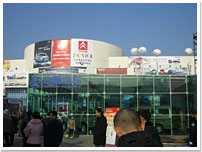 |
| Venue No.1 |
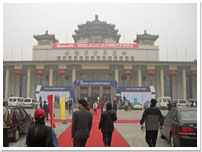 |
| Venue No.2 |
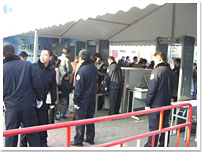 |
| Security check at entrance |
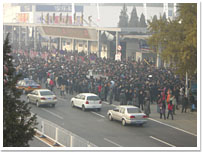 |
| Entrance gate |
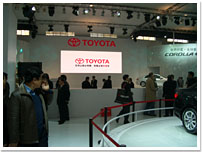 |
| Toyota booth |
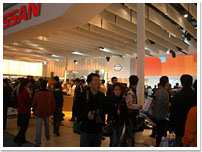 |
| Nissan booth |
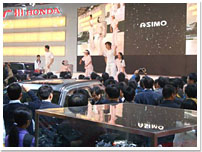 |
| Honda booth |
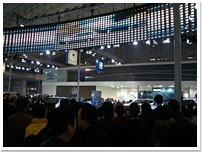 |
| GM booth |
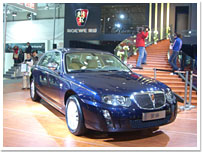 |
| Shanghai Automotive booth |
|